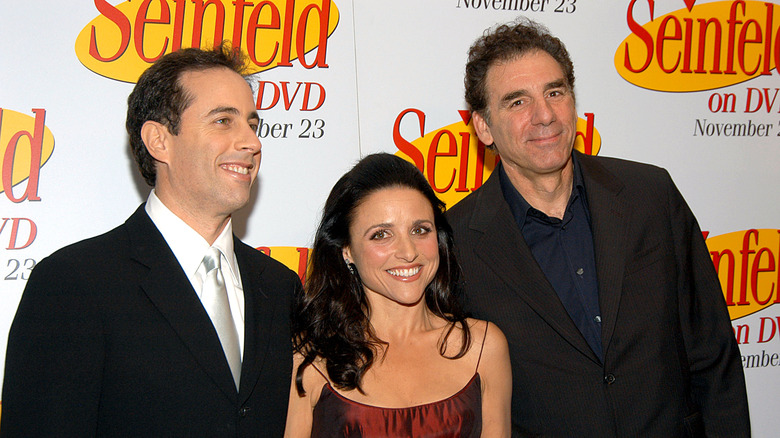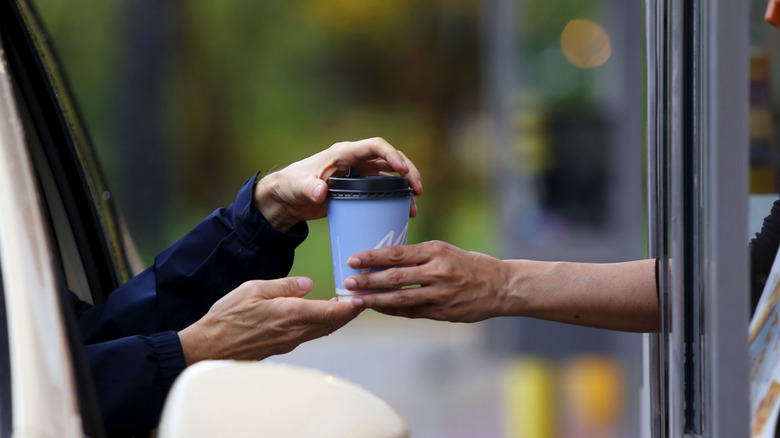This Seinfeld Coffee Plot Was Based On A Real Lawsuit
"Seinfeld," the world's most famous "show about nothing," ran for an impressive nine seasons, with an average of 30 million viewers gathering before their television sets every week to watch the series, per the Los Angeles Times. It showed the hilarious antics of a group of friends navigating the daily minutiae and annoyances of everyday life in New York City. Of course, no show about the ins and outs of daily life would be able to avoid the topic of food, one of the most essential parts of the day, so there were plenty of scenarios involving restaurants and grub on the show's long run.
In the beginning of Season 7, the show covered one of their most iconic food moments in a two-episode arc. Over the course of the episodes "The Postponement" and "The Maestro," Kramer (played by Michael Richards) is moved to sue a coffee shop named Java World after burning himself on a hot latte, according to Eater. (This was around the time coffee chain Starbucks was taking off nationally.) However, while this show might have become popular for dealing with everyday minutiae, the real-life lawsuit from which it drew its inspiration for these episodes was anything but fictional.
The episodes were inspired by the infamous McDonald's coffee case
In fact, this story was based on a very real incident that occurred in 1992, when a woman named Stella Liebeck sued McDonald's after a cup of their coffee spilled in her lap and caused third degree burns. According to Vox, the 79-year-old had been seated in the passenger seat of a parked car when she accidentally spilled a freshly-purchased McDonald's coffee on her lap. The hot liquid was absorbed by the sweatpants she had been wearing, thus holding the burning coffee against her skin. As a result, Liebeck suffered very serious injuries, including third-degree burns on her legs and genitals that required skin grafts, which ultimately led her to sue the fast food giant.
The lawsuit became something of a joke in the media, with many headlines lambasting the lawsuit as frivolous. But the truth was actually a little more complicated. McDonald's had been serving their coffee at dangerously hot temperatures of up to 190 degrees Fahrenheit, according to the Vox article, and 700 other people had also reported being scalded by their near-boiling coffee in the year before Liebeck ever purchased her fateful cup.
Far from seeking a big payout, as some news sources tried to claim and as "Seinfeld" spoofed, Liebeck merely wanted the massive fast food company to pay out $20,000 simply to cover the cost of her extensive out-of-pocket medical bills and lost income. However, McDonald's, rather than admit fault, refused to pay and offered her a paltry $800, per the CAOC, which resulted in the lawsuit moving forward.
A jury decided McDonald's was employing unsafe practices
In the "Seinfeld" episode, of course, Kramer settles for a lifetime supply of free coffee, as seen on YouTube.
But in real life, unable to settle out of court, the Liebeck vs. McDonald's case ended up going to trial.The jury, upon hearing that McDonald's had been knowingly serving their customers coffee at dangerous temperatures for some time, decided to make something of an example out of the chain. It had come out that this was not the first time McDonald's had faced complaints and suits over the extremely high temperature of their coffee. In fact, it soon became clear that the chain had been aware of this issue for a decade, but had refused to change their dangerous practices, per Vox.
The jury concluded McDonald's should pay out almost $2.9 million for their irresponsible behavior, with one juror calling it a case of "callous disregard for the safety of the people" and another deciding "the facts were so overwhelmingly against the company," according to the CAOC. In the end, McDonald's stopped serving their beverages at extremely hot temperatures, and Liebeck settled for under $600,000. However, she was forced to endure a years-long misinformation campaign in the media and spoofs on television, designed to make her look as though she was simply a greedy customer looking for a payout, rather than an elderly woman seeking compensation after having been seriously injured due to a corporation's unsafe practices.


